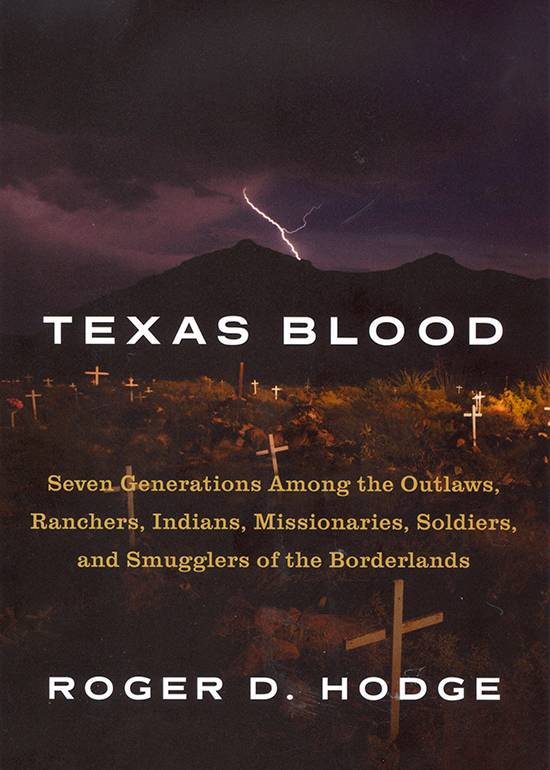My Kinsmen

Texas Blood: Seven Generations Among the Outlaws, Ranchers, Indians, Missionaries, Soldiers, and Smugglers of the Borderlands
by Roger D. Hodge
New York: Alfred A. Knopf, 2017.
353 pp. $28.95 cloth.
Reviewed by
Felipe Hinojosa
Earlier this year, the Texas State Board of Education set off a fierce debate when it considered removing value-laden terms such as “hero” or “heroic” when describing the acts of those who fought to defend the Alamo. The mere hint that the State Board was considering something like this brought on the ire from conservative Texans across the state. You see, in Texas we love our history—and we love to tell big stories about our history. The more our history is tied to Hollywood embellishments or John Wayne type heroisms, the better. It is exactly this big Texas story that Roger Hodge takes on in his latest book, Texas Blood. Written as part family history and part travel memoir, Texas Blood captures the stories, images, and landscapes of Texas history. But rather than reiterating its myths—rather than calling Texas heroic—Hodge tells us a different story. This is a story rooted in the history of violence, border surveillance, and hipster enclaves all while documenting the story of his family’s migration history from Tennessee to Missouri to Texas.
This is Texas history on the road. It is a narrative trip where one minute the reader is dragged through Texas’s Indian past and in the next the author is eating a kale salad in Marfa. The twists and turns are endless. But it is exactly these moments that make Texas Blood a captivating read and much more than another white man’s version of Texas history. From beginning to end, we are introduced not only to the landscapes of West Texas, but to a man searching for a past too often sanitized with fictions of grandeur. The book is full of proverbial gems, of wisdom that reaches across the generations—and across the landscapes—to grab us and shake us of any notion that our history is clean and neat. Some are profound, and some are silly, and I think that’s Hodge’s point.
There are many things right with Texas Blood. The writing is precise, with powerful and well-crafted sentences. And the storytelling moves at a steady and varied pace; taking the reader from a discussion of Sam Houston’s nineteenth century life to a twenty-first century motel that “looked like a good candidate for freelance meth cooking.” Hodge is intent on making sure his readers see Texas as a story in the making; as a place whose history of violence and oppression is never far removed from the new migrants coming from Los Angeles to eat delicious kale salads in West Texas. All of that is Texas.
And yet as alluring as this vision of Texas is, I was puzzled by the relative absence of the state’s largest ethnic minorities: Mexicans and Mexican Americans. Texas Blood begins in the small borderland town of Del Rio, Texas, but it does not stay there long. In fact, we learn little about Del Rio, about its Mexican American population and their struggles against segregation in the public schools. For a state that once belonged to Mexico, there are few Mexicans in this book. Hardly anything about their struggles for integration, the state sanctioned violence they suffered at the hands of the Texas Rangers, or their history as laborers in Texas’ agricultural and oil fields. This oversight creates obvious problems and gives us an incomplete portrait of Texas.
To be fair, Texas Blood is only one portrait of Texas and its borderlands. And it’s a good one, full of fresh new angles, characters, and narratives. But what you won’t find here are heroes, Hollywood narratives, or John Wayne. Texas and its borderlands are too expansive, too complex, and too violent for myopic versions of history. In Texas Blood, Hodge brings us closer to the truth, closer to the enigma that is Texas. There is no singular Texas history; but instead histories and herstories that serve as reminders of past struggles and of the fights ahead. Texas Blood makes no presumptions; there are no shiny lights, no pop culture pizzazz, only the assertion that there are truths in history that are waiting to be written. How we discover those truths, whether in a rental car, on horseback, or in the archives, is up to us. Go read this book. Then write your own story about Texas.
Felipe Hinojosa is an Associate Professor and Director of Undergraduate Studies in the Department of History at Texas A&M.
